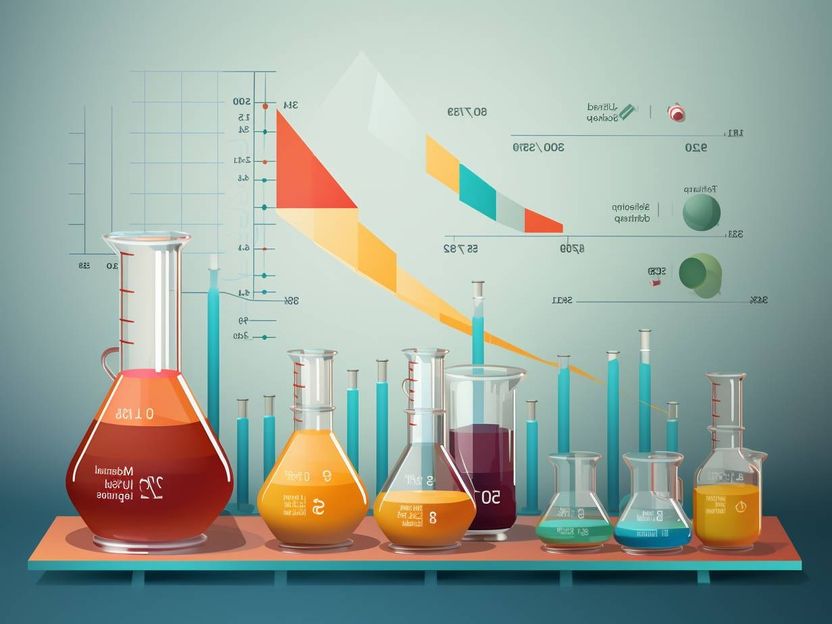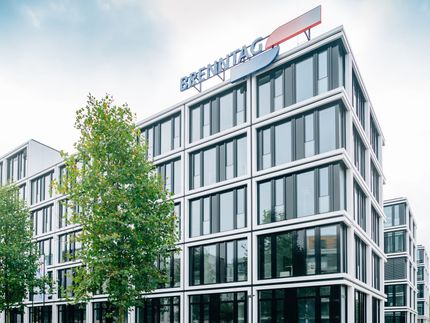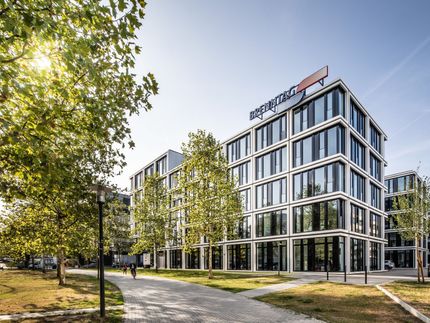Weak Demand in Chemical Business Impacts WACKER’s Sales and Earnings Growth in Q2 2023
Advertisement
Wacker Chemie AG saw its sales and earnings decline in the second quarter of 2023 due to the persistently difficult market environment. The Munich-based chemical company generated sales of €1.75 billion in the reporting quarter (Q2 2022: €2.17 billion), down 19 percent. This decrease was chiefly due to lower selling prices and volumes. Exchange-rate effects also reduced sales. Compared with the preceding quarter (€1.74 billion), however, sales were up 1 percent.

Symbolic image
Computer-generated image
EBITDA (earnings before interest, taxes, depreciation and amortization) totaled €256 million in Q2 2023, down 59 percent year over year (€626 million). The decline was due to lower volumes and prices as well as lower utilization rates for some plants. Higher energy and raw material prices continued to have a negative effect as before. The WACKER Group’s reporting-quarter EBITDA margin was 14.6 percent (Q2 2022: 28.8 percent). The margin in the preceding quarter was 16.1 percent.
Group earnings before interest and taxes (EBIT) totaled €153 million in the reporting quarter. This was 71 percent less than a year earlier (€529 million) and corresponded to an EBIT margin of 8.7 percent (Q2 2022: 24.3 percent). Net income in the second quarter of 2023 totaled €119 million (Q2 2022: €391 million) and earnings per share came in at €2.40 (Q2 2022: €7.67).
Against the backdrop of ongoing weak customer demand in many industries, continuing inventory reduction measures by customers and the lower year-over-year prices for many of its products, WACKER revised its forecast for 2023 on July 18. The company now expects sales of between €6.5 billion and €6.8 billion (previous guidance: between €7 billion and €7.5 billion). Full-year EBITDA for 2023 is expected to be between €800 million and €1.0 billion (previous guidance: between €1.1 billion and €1.4 billion).
“The pace of global economic growth has slowed significantly in recent months and WACKER has not been immune to this. In the first half of the year, we did not reach our strong prior-year figures in terms of Group sales and EBITDA,” said Group CEO Christian Hartel on Thursday in Munich. Numerous market experts had originally been anticipating stronger demand in the second half of 2023 – an assumption that was also reflected in WACKER’s forecast. However, WACKER, like so many other chemical companies, has yet to see a recovery.
“The majority of our customers in the chemical business continue to see demand stagnate. Despite a weak start to Q2, our solar business ended up recording higher volumes, but, at the same time, we are observing a fall in prices for solar-grade polysilicon in China. The earnings trend in our biotech business will be impacted once again this year by elevated investment spending in further growth. All our divisions are seeing high energy prices and inflation rates continue to slow their performance,” he added.
Hartel emphasized that WACKER, however, was well positioned in the medium and long term. “Our Strategy 2030 provides us with clear goals: faster growth, high profitability, and better resilience in times of constant change. Investment in our future growth plays an important role in achieving these goals,” Hartel said. The CEO emphasized that WACKER’s strategy remains clearly on track. “In the reporting quarter we significantly boosted our investment spending on global expansion of our capacity compared with the previous year,” said Hartel.
The reporting quarter saw WACKER complete construction of a new spray dryer and a new dispersion reactor at the Group’s Nanjing site in China, for example. Production capacity in Nanjing has more than doubled as a result. The company also pressed ahead with the expansion of its biotech activities. In May, WACKER acquired ADL BioPharma, a contract manufacturer for the food, pharmaceuticals and consumer-goods industries, based in León, Spain. “This acquisition takes us one decisive step closer to meeting the growth objectives of our life sciences business,” added Hartel. “We are also investing in our polysilicon business, building a new production line at our Burghausen site for cleaning semiconductor-grade polysilicon. As the only European producer of hyperpure polysilicon, we are proud to be making an important contribution to strengthening Europe’s micro-electronics value chain through this project,” the CEO emphasized.
Regions
In the second quarter of 2023, Group sales fell in all regions primarily as a result of reduced volumes and lower prices. Sales in Asia de-creased to €810 million, around 14 percent lower than a year earlier (Q2 2022: €944 million). Sales in the Americas totaled €268 million, down 23 percent versus a year earlier (Q2 2022: €348 million). Group sales in Europe amounted to €598 million in the reporting quarter (Q2 2022: €767 million), a decline of 22 percent compared with the prior year.
Capital Expenditures and Net Cash Flow
The Group’s capital expenditures in Q2 2023 totaled €145 million (Q2 2022: €100 million), up 45 percent on the previous year. Most of WACKER’s capital expenditures were allocated to expanding capacity in the chemical divisions. Other investment spending was directed, for example, toward increasing capacity for biopharmaceuticals.
Net cash flow was €-99 million in the reporting quarter, after €96 million in Q2 2022. This was primarily due to higher capital expenditures and acquisition of ADL BioPharma based in León, Spain.
Employees
WACKER’s global workforce grew in the reporting quarter. The Group had 16,358 employees on June 30, 2023 (March 30, 2023: 15,877). At the end of the reporting quarter, 10,569 employees worked at WACKER sites in Germany (March 31, 2023: 10,490) and 5,789 at international locations (March 31, 2023: 5,387).
Business Divisions
In Q2 2023, WACKER SILICONES generated total sales of €699 million, 25 percent less than in the same period last year (€936 million). The main factors slowing sales were lower prices and reduced volumes. Compared with a quarter earlier (€760 million), sales declined 8 percent. Reporting-quarter EBITDA for WACKER SILICONES amounted to €52 million, down 81 percent from the year-earlier figure (€276 million) and around 46 percent less than a quarter ago (€96 million). The earnings trend was impacted by reduced plant utilization rates year over year in addition to lower prices – especially for standard products. Persistently high energy and raw material prices also had a negative impact on earnings. The EBITDA margin in Q2 2023 was 7.4 percent, after 29.5 percent in Q2 2022 and 12.6 percent in the preceding quarter.
Sales at WACKER POLYMERS totaled €417 million in the reporting quarter, 25 percent lower than a year earlier (€553 million). This decline was prompted primarily by lower prices and reduced volumes. Compared with a quarter earlier (€428 million), sales declined 3 per-cent. The division’s Q2 2023 EBITDA amounted to €76 million, down 16 percent from a year earlier (€91 million). In addition to lower prices, declined plant utilization rates also reduced EBITDA. The per¬sistently high energy costs also had a negative impact on earnings. Compared with the prior quarter (€71 million), EBITDA was up 7 percent. The reporting-quarter EBITDA margin was 18.1 percent, after 16.5 percent a year earlier and 16.6 percent a quarter ago.
WACKER BIOSOLUTIONS generated total sales of €91 million in Q2 2023, up 8 percent on the same period last year (€84 million). Compared with the preceding quarter (€77 million), the division’s sales were up 18 percent. EBITDA at WACKER BIOSOLUTIONS totaled €-0.5 million in the reporting quarter and was €8.4 million lower than a year earlier (€7.9 million). It was impacted in part by the upfront costs involved in establishing the mRNA Competence Center in Halle. Compared with the preceding quarter (€-1.6 million), on the other hand, the division’s EBITDA rose by €1.1 million. The EBITDA margin amounted to -0.6 percent, after 9.4 percent a year ago and -2.1 percent in Q1 2023.
WACKER POLYSILICON generated total sales of €513 million in the reporting quarter, 10 percent lower than in the same period last year (€568 million). This decrease was primarily due to lower average prices for solar-grade polysilicon year-over-year as well as somewhat reduced volumes. By contrast, prices for semiconductor-grade polysilicon were higher in the reporting quarter than they were a year ago. Compared with Q1 2023 (€441 million), sales grew 16 percent. This was primarily due to significantly higher volumes compared with a quarter earlier. WACKER POLYSILICON’s reporting-quarter EBITDA amounted to €156 million, 27 percent lower than in the same period last year (€214 million). In addition to the price and volume effects mentioned, the development of earnings growth was held back by persistently high costs for energy and silicon metal. However, compared with the prior quarter (€98 million), EBITDA was up 59 percent. From April through June 2023, the division’s EBITDA margin amounted to 30.5 percent, after 37.6 percent in Q2 2022 and 22.2 percent in Q1 2023.
Outlook
WACKER detailed its projections for the Group’s performance this year in the Outlook section of its 2022 Annual Report.
Against the backdrop of ongoing weak customer demand in a large number of industries, continuing inventory reduction measures by customers and the lower year-over-year prices for many of the company’s products, WACKER revised its forecast for the current year on July 18, 2023.
As already announced, the WACKER now expects several key financial performance indicators for 2023 to be lower than previously projected. Numerous market experts had been anticipating stronger demand in the second half of 2023 – an assumption that was also reflected in the Group’s previous forecast. However, a recovery is yet to be seen.
WACKER now expects Group sales for 2023 to be between €6.5 billion and €6.8 billion (previous guidance: between €7 billion and €7.5 billion). Full-year EBITDA is expected to be between €800 million and €1.0 billion (previous guidance: between €1.1 billion and €1.4 billion). The Group still expects the EBITDA margin to be substantially lower than last year. ROCE is now projected to be below the cost of capital (previous guidance: above the cost of capital, albeit considerably lower than a year ago). Forecasts are unchanged for capital expenditures, net cash flow, net financial debt, and depreciation / amortization.























































